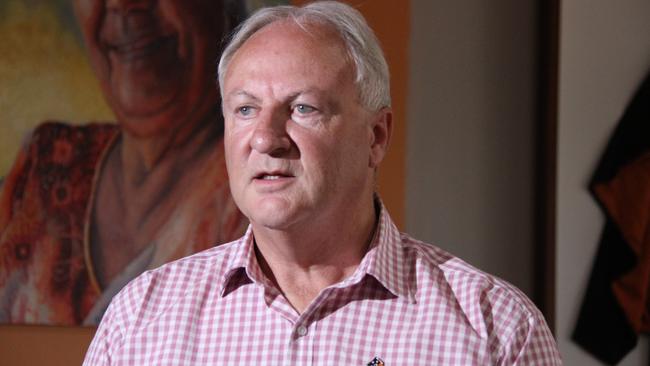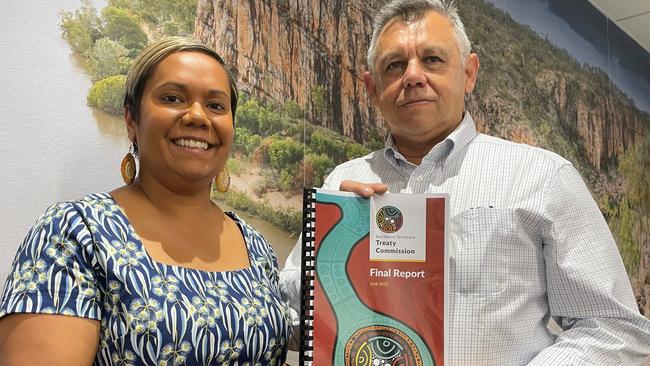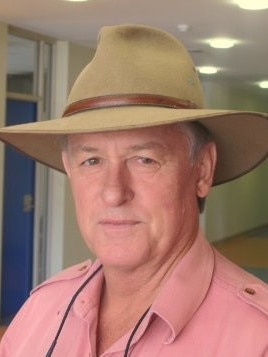Treaty negotiations, Local decision making agreements axed as CLP turns focus to local government reform
‘Walking away from treaty is like locking us up and throwing away the key’: Aboriginal groups say they will stay the course as CLP government herald a new era of Aboriginal Affairs in the NT.

Indigenous Affairs
Don't miss out on the headlines from Indigenous Affairs. Followed categories will be added to My News.
An alliance of the most powerful Aboriginal organisations in the Northern Territory says it has not given up the fight for a treaty, while accusing the Finocchiaro government of “dismissing our leadership” by axing negotiations.
The Country Liberal’s election win heralded a significant shift in Aboriginal affairs in the NT – several of Labor’s key policies marked dead on arrival of the new government.
The CLP has officially abandoned treaty plans, will not pursue future Local Decision Making (LDM) agreements, and the ‘Everyone Together’ 10-year strategy meant to run until 2029 has been removed from the department’s website.
Focus has instead turned to boosting local government representation, with the promise of restoring local control of communities to Aboriginal people.

Of all the reforms, Aboriginal Peak Organisations NT said loss of treaty progress was most “deeply disappointing”.
“It demonstrates that the Finocchiaro government lacks the courage to be bold and focus on what is right for Aboriginal people across the Territory,” lead convenor John Paterson said.
“We continue to call for a commitment to the opportunity of treaty with our peoples; to honour truth and justice, and recognise and embed inclusive, representative Aboriginal voices.”
Dr Paterson said that with no Aboriginal members in the CLP’s parliamentary team, APONT was concerned about the government’s “commitment to Aboriginal peoples’ rights and recognition in the NT”.
The Northern Land Council echoed its commitment to treaty, and blamed years of stalled progress on negotiations under Labor as a missed opportunity – one that has ultimately cost taxpayers $5.3m since 2018.

East Arnhem MLA and Yolngu Elder Yingiya Mark Guyula said constant policy flip-flops reduced policy effectiveness, and emphasised the need for consistent Aboriginal decision making.
“By the end of eight years with Labor, they were starting to hear what we are saying and then we get a new government, and we have to start again,” Mr Guyula said.
“We have communities that are thinking about forming LDM’s but now they are told to forget about it.
“Systems get put in place, and we all take the time to learn the systems and then they change, and we have to learn a new one.
“All we need is a balanda (non-Aboriginal) bookkeeper and Yolngu make the decisions and run the community and that shouldn’t change when the government changes – that should be put in place and remain the same no matter what.
“We don’t need new government policies, we need government to listen to us, so we can implement our policies, so that we can run our own affairs and we have consistency no matter who’s in power.
“The government walking away from treaty is like locking us up and throwing away the key and leaving us stuck inside with no breathing space – eventually we will die.”

While in opposition the CLP accused Labor of disempowering bush communities when it dismantled Community Government Councils in 2008; a move which amalgamated smaller councils into so-called supershires.
The CLP pledged to work with communities to co-create a framework which restored decision-making power to those who did want a greater say; a bespoke approach that would allow local leaders to deliver municipal services, housing repairs, maintenance, and more.
“We made it very clear in the lead-up to the 2024 election that our first priority is empowering bush communities with real reforms which deliver meaningful and fair results to Aboriginal Territorians,” Aboriginal Affairs Minister Steve Edgington said.
“Our government is delivering on our commitment to restore local control of communities to Aboriginal people, strengthening service delivery and fostering self-determination through important reform.”
Consultation on breaking up local government supershires is expected to commence from April.
Mr Edgington said the CLP remained committed to the National Agreement on Closing the Gap and would honour the 20 existing LDMs until their expiry dates.

The Labor Opposition (reduced to four Aboriginal bush-seat members after wipe-out losses in urban electorates) said it continued to support the treaty process, and called on the CLP to uphold existing and future LDMs.
It said the government’s plan for local government reform risked wasting “more than a billion dollars of public money on a system has been proven to be ineffective”.

Charles Darwin University researcher and longtime political observer Rolf Gerritsen said the CLP’s approach to Indigenous affairs reflected a broad national trend among conservative parties which aimed to decentralise power to the regions.
He said social challenges posed difficulty for almost all approaches governments’ sought to take, and was sceptical about the effectiveness of both CLP and Labor policies.
“Aboriginal society and governance is under huge pressure,” he said.
“An Aboriginal person living on the Arnhem Coast doesn’t have a lot in common with an Aboriginal person living in Central Australia, so making sense of governing organisations at the local level is difficult, and while local governing controls may be stronger in parts of the Territory, generally speaking they are not very strong.
“Meanwhile similar issues mean a treaty risks becoming a symbolic document that makes no difference.
“I do think we need sort of a bipartisan discussion to agree on what we need to deliver to Aboriginal communities to make them functional, and to make them places where people want to live.
“We need to think in 30 year time frames, not three or four year terms.”





